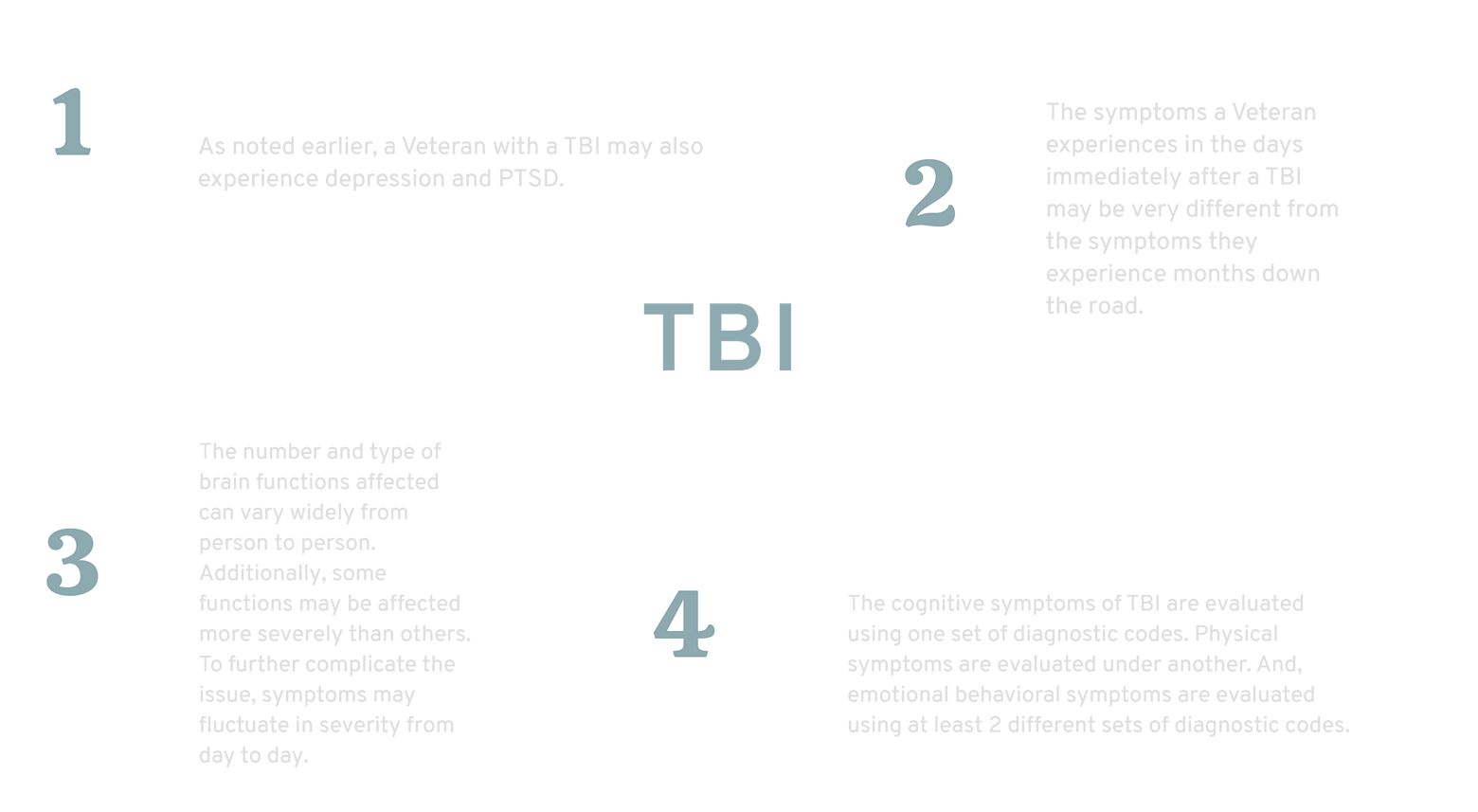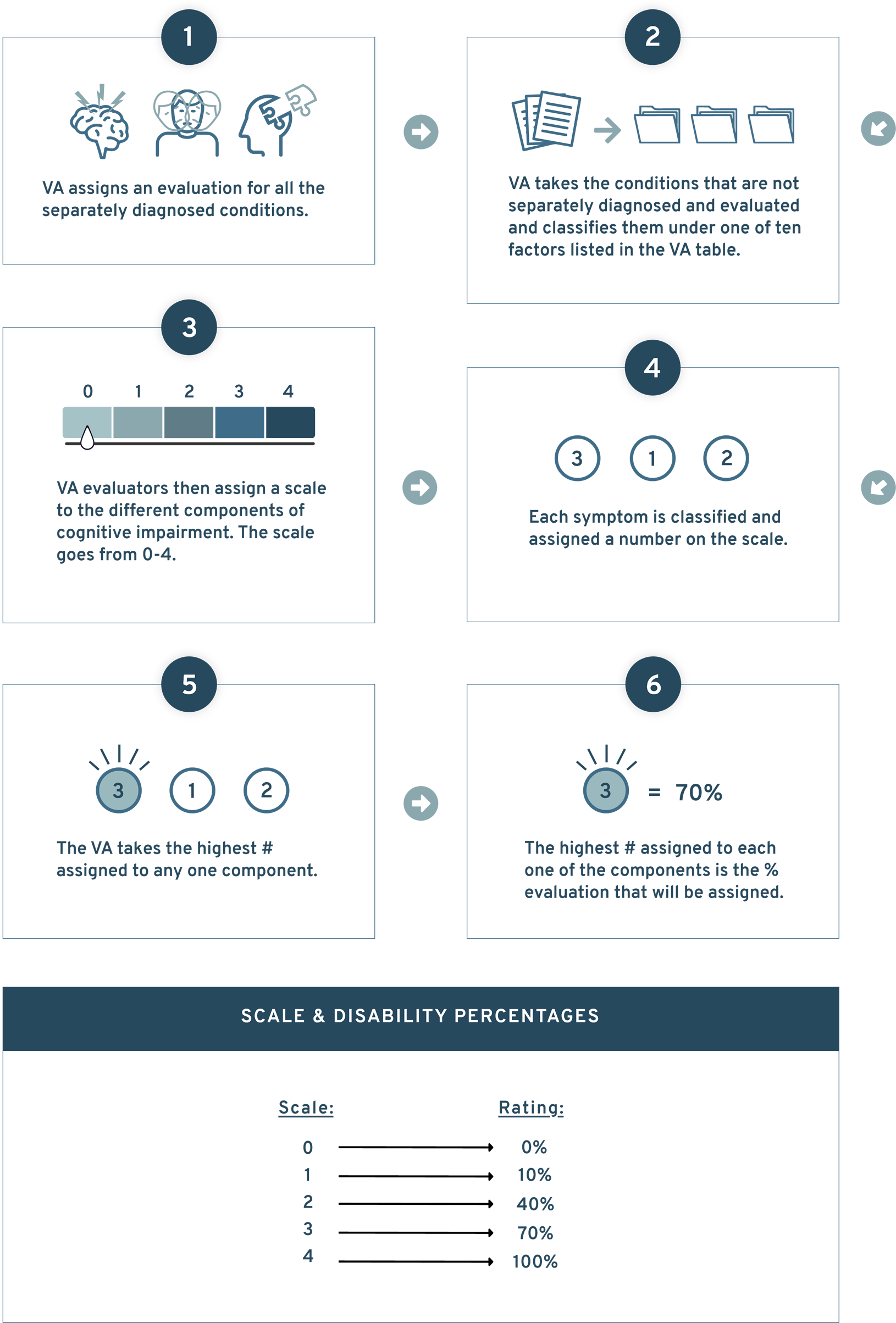One of the signature injuries of the wars in Iraq and Afghanistan is traumatic brain injury (TBI).

The reason for this is because of the frequent use of roadside improvised explosive devices and the resulting blasts. Keep in mind, however, that there are many TBI’s that have not come from improvised explosive devices in Iraq or Afghanistan. Other causes of TBI include an in-service motor vehicle accident, or an in-service fall where a Veteran hits his head. They may also come from a personal assault or any other type of trauma where the head is injured.
The consequences of traumatic brain injuries are far reaching and affect many areas of a veteran’s life. TBI’s often produce not only physical problems, but cognitive (aka thinking) problems, and behavioral problems. According to the RAND study, about 19 percent of troops surveyed report a probable TBI during deployment.
Traumatic brain injuries are difficult to identify and are often not easily distinguished from Post Traumatic Stress Disorder or depression. In fact, tens of thousands of troops are suffering from PTSD and depression in addition to TBI.

Call our office toll free at (888) 878-9350 for your free case evaluation for your TBI claim.
Confidential
Evaluation
Want More
Traumatic Brain Injury
Related Content?
Change in Rating Criteria for TBI
The old rating criteria for evaluating TBIs was clearly not sufficient to address the wide range of issues veterans face so VA revised the rating criteria in January 2008.
This change became effective October 23, 2008.
Under the old rating system any one subjective symptom could not be given a service rating above 10%. A subjective symptom is one where severity depends on self-reporting by the Veteran. Subjective symptoms include things like severity of headaches, dizziness, or ability to concentrate.
Under the new VA disability rating system, symptoms are evaluated in the 3 categories described below and the disability rating is based on the combined total level of disability in all areas.
Symptoms of TBI in Veterans
There are three main areas of dysfunction that need to be evaluated when considering veterans disability benefits for TBI.
Cognitive Symptoms
Decreased memory, concentration, attention, and executive functioning of the brain.
- Goal setting
- Information processing
- Planning
- Organizing
- Prioritizing
- Problem solving
- Judgment
- Decision making
- Mental flexibility
Emotional & Behavioral Symptoms
- PTSD
- Depression
- Anxiety
- Other Mental Disabilities
- Irritability
- Aggression
- Withdrawal
- Poor Impulse Control
- Immature behavior
- Over-Dependency
- Excessive Talking
- Inappropriate Sexual Behavior
- Over Spending
Physical Symptoms
- Vision Loss
- Hearing Loss & Tinnitus
- Constant Headaches
- Seizures
- Motor or Sensory Dysfunction
- Pain in the Face or Other Parts of the Body
- Loss of smell or taste
- Inability to communicate as they had previously before
- Endocrine Dysfunctions
- Bladder or Bowel Impairments
- Other Autonomic Nerve Dysfunctions.
Find Out What Your Benefits Should Be
Use our disability calculator
Diagnosing TBI in Veterans is Complicated
While the new VA disability rating system was expanded to acknowledge the complexity of TBI, it doesn’t necessarily make TBI easier to diagnose. TBI is a complicated disability to properly diagnose for several reasons.

-
1
TBI symptoms overlap with other disabilities.
As noted earlier, a Veteran with a TBI may also experience depression and PTSD.
-
2
Each TBI is unique.
The number and type of brain functions affected can vary widely from person to person. Additionally, some functions may be affected more severely than others. To further complicate the issue, symptoms may fluctuate in severity from day to day.
-
3
Symptoms can change over time.
The symptoms a Veteran experiences in the days immediately after a TBI may be very different from the symptoms they experience months down the road.
-
4
VA uses multiple diagnostic codes.
The cognitive symptoms of TBI are evaluated using one set of diagnostic codes. Physical symptoms are evaluated under another. And, emotional behavioral symptoms are evaluated using at least 2 different sets of diagnostic codes.
How the VA Handles TBI Claims

-
1

VA assigns an evaluation for all the separately diagnosed conditions.
-
2

VA takes the conditions that are not separately diagnosed and evaluated and classifies them under one of ten factors listed in the VA table.
-
3

VA evaluators then assign a scale to the different components of cognitive impairment. The scale goes from 0-4.
-
4

Each symptom is classified and assigned a number on the scale.
-
5

The VA takes the highest # assigned to any one component.
-
6

The highest # assigned to each one of the components is the % evaluation that will be assigned.
Betrayal of Valor

An exposé of a horribly flawed veteran’s administration
